U.K. Vows to Ban Resale of Concert Tickets Above Face Value

© The New York Times

© The New York Times

法新社消息称,乌克兰西部周三(11月19日)遭遇俄军今年最致命的袭击之一,至少25人死亡,其中包括3名儿童,另有90多人受伤。当天正值乌克兰总统泽连斯基在土耳其重启和平谈判,但他的努力未能使谈判取得进展。
在安卡拉与土耳其总统埃尔多安会晤后,泽连斯基表示,希望乌俄之间的战俘交换能“在年底前”恢复。根据一名乌克兰官员对法新社的说法,此次访问在没有俄方参与的情况下进行,旨在“重新推动美国参与和平进程”。然而,美国特使维特科夫并未出席,而俄罗斯则继续对乌克兰城市和能源基础设施实施打击。
目前,华盛顿和莫斯科正在秘密制定一项结束这场近四年战争的和平计划,但俄罗斯方面拒绝评论美国媒体 Axios 的报道。
法新社独家消息称,两名知情人士表示,美国已向乌克兰泽连斯基明确表示,乌克兰必须接受美国制定的一项结束俄乌战争的计划。该方案的主要内容包括:乌克兰让出部分领土;乌克兰交出部分武器;削减乌克兰武装力量规模。
在俄罗斯正在乌克兰东部推进、且泽连斯基正陷入一场导致议会正式罢免两名部长的腐败丑闻之际,这样的计划将对乌克兰构成沉重打击。
一名乌克兰高级官员稍早告诉路透社,乌克兰并未参与这项和平计划的制定过程。
自7月在伊斯坦布尔举行的一次会议以来,俄乌谈判代表之间未再举行面对面会议。虽然外交斡旋似乎有所升温,但莫斯科至今未对其原先立场作出任何让步。普京曾于2024年6月提出他的条件,要求基辅放弃加入北约,并从莫斯科声称属于俄罗斯的四个地区撤军。俄方并未表现出放弃这些要求的迹象,而乌克兰则坚称无法接受。

 @zinkevich_igor
@zinkevich_igorNine people have been killed in Russian strikes on Ukraine overnight, Ukraine's president Volodymyr Zelensky has said.
Russia launched more than 470 drones and 47 missiles in the "brazen attack", he wrote in a post on Telegram.
Three districts of Ukraine's second city, Kharkiv, were hit by a massive drone attack which injured more than 30 people, including children. Photos posted online showed buildings and cars ablaze.
Power cuts are affecting a number of regions across the country, Ukraine's energy ministry said.
This breaking news story is being updated and more details will be published shortly. Please refresh the page for the fullest version.
You can receive Breaking News on a smartphone or tablet via the BBC News App. You can also follow @BBCBreaking on X to get the latest alerts.

 Getty Images
Getty ImagesA portrait by the Austrian artist Gustav Klimt was sold for $236.4m (£179m) in New York on Tuesday, making it the second most expensive piece ever sold at auction.
Six people took part in a 20-minute bidding battle for the Portrait of Elisabeth Lederer which was painted between 1914 and 1916.
Auction house Sotheby's has not disclosed the buyer's identity.
The portrait was looted by the Nazis and almost destroyed in a fire in World War Two, but was rescued in 1948.
The artwork was returned to Lederer's brother, Erich, a friend and subject of Klimt's contemporary, Egon Schiele. The piece remained in Lederer's possession for most of his life, before he sold it in 1983, according to Sotheby's.
The painting shows Lederer, an heiress and the daughter of one of Klimt's patrons, wearing a white robe and stood in front of a blue tapestry covered in Asian motifs.
The Nazis, who annexed Austria in 1938, looted the Lederer art collection but left family portraits behind, says the National Gallery of Canada.
Estée Lauder heir Leonard A Lauder made it part of his private collection in 1985, where it was displayed in his Fifth Avenue home in New York.
Tuesday's sale shot past expectations, with the painting predicted to sell for $150m before the auction. The second highest sale for a Klimt on record was Lady with a Fan, which sold for $108.8m in 2023 in London.
Several other Klimt works in Lauder's collection were auctioned at the same event, including Flowering Meadow and Forest Slope at Unterach am Attersee, which fetched between $60m and $80m each.
The most expensive artwork ever sold at auction was Salvator Mundi, attributed to Leonardo da Vinci, which sold in 2017 for $450.3m.
Tuesday also saw a sculpture of a fully functioning gold toilet by the conceptual artist Maurizio Cattelan picking up $12.1m just an hour after the record-breaking Klimt sale.
The 101-kg toilet received just one bid. Sotheby's said that the buyer was a famous American brand.

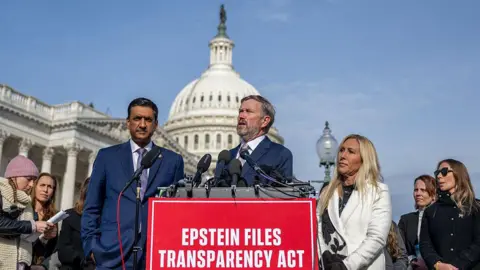 Getty Images
Getty ImagesBoth chambers of Congress agreed to order the US justice department to release its files on sex offender financier Jeffrey Epstein.
The House of Representatives overwhelming approved the measure in a 427-1 vote and the Senate unanimously fast-tracked it without a formal vote.
The moves come just days after President Donald Trump reversed his position and urged Congress to vote to disclose the records following public pushback from many of his supporters.
Last week, Trump and his ties to Epstein were thrust back into the headlines after more than 20,000 pages of documents - some mentioning the president - were released. The White House denied any wrongdoing.
Republican Clay Higgins, of Louisiana, was the sole House objector and cited his concern about “innocent people being hurt” with the release of the information.
Trump’s reversal from attacking those on Capitol Hill who wanted the files released to saying there was “nothing to hide” surprised some in Washington.
The Republican congressional leadership was caught off guard after aligning their message with the president for the past few weeks and opposing the release.
House Speaker Mike Johnson had repeatedly called the push to release the Epstein files a "Democrat hoax".
On Tuesday, he voted in support of release.
The measure had been expected to take a few days to reach the US Senate, but after the resounding afternoon vote in the House, the timeline quickly sped up.
Senate Minority Leader Chuck Schumer brought up the bill on the floor of the Senate under a procedure called unanimous consent. Because no one objected, there was no debate and no amendments added to the bill.
It will head from the Senate to the president‘s desk, where he is expected to sign it into law.
A congressional vote was not required to release the files - Trump could have ordered the release on his own.
The bill requires Attorney General Pam Bondi to release “all unclassified records, documents, communications, and investigative materials” related to Epstein and his co-conspirator Ghislaine Maxwell no later than 30 days after the law is enacted.
Those materials include internal justice department communications, flight logs and people and entities connected to Epstein.
But the bill also gives Bondi the power to withhold information that would jeopardise any active federal investigation or identifies any victims.
Epstein, a financier, was found dead in his New York prison cell in 2019 in what a coroner ruled was a suicide.
He was being held on charges of sex trafficking, having previously been convicted of soliciting prostitution from a minor in 2008.
During two criminal investigations into Epstein, thousands of documents were gathered, including transcripts of interviews with victims and witnesses.
Trump and Epstein previously socialised in similar circles, but the president said he cut ties with Epstein many years ago, before his 2008 conviction. The president also said he was unaware of Epstein’s criminal activity.
Last week, Democrats on the House Oversight Committee published three email chains, including correspondence between Epstein and Maxwell, who is currently serving a 20-year prison sentence for sex trafficking.
Some of those make mention of Trump, including one email, sent in 2011, in which Epstein wrote to Maxwell: “I want you to realize that that dog that hasn’t barked is Trump.. [VICTIM] spent hours at my house with him.”
The White House said last week that the victim referenced in the email was prominent Epstein accuser Virginia Giuffre.
Giuffre, who died in April, has said that she never saw Trump participate in any abuse and there is no implication of any wrongdoing by Trump in the emails.
Trump has consistently denied any wrongdoing in relation to Epstein. White House Press Secretary Karoline Leavitt said the emails were "selectively leaked" by House Democrats to "liberal media to create a fake narrative to smear President Trump".
The push for the release of the investigative files held by the Department of Justice was led by Republican Thomas Massie, a Kentucky congressman who sometimes dissents from his party, and Democrat Ro Khanna, a California congressman, both of whom introduced the legislation.
Massie has faced criticism from Trump for his push to release the files, but has stood firm.
“In 2030, he’s not going to be the president,” Massie said to ABC News over the weekend. He added that fellow Republicans who voted against release "will have voted to protect paedophiles”.
Another Republican who has pushed for the release of the files is House Representative Marjorie Taylor Greene. She had been a staunch supporter of Trump before the two fell out over the issue, with the president now calling her a "traitor".
At a news conference earlier in the day on Tuesday, Greene said she is speaking up on behalf of Epstein's survivors. She also called out Trump directly.
"Let me tell you what a traitor is. A traitor is an American that serves foreign countries and themselves; a patriot is an American that serves the United States of America and Americans like the women standing behind me," Greene said.
She said that row over Epstein has been one of the "most destructive things" to Trump's Make America Great Again movement since his election in 2016.
Survivors of Epstein’s abuse also spoke at the news conference, urging lawmakers to release the files and pushing Trump to do the same.
Epstein survivor Annie Farmer said that keeping the files under wraps amounted to “institutional betrayal”.
“Because these crimes were not properly investigated, so many more girls and women were harmed,” Ms Farmer said.
US President Donald Trump has said Saudi Crown Prince Mohammed bin Salman "knew nothing" about the 2018 killing of journalist Jamal Khashoggi, as he welcomed the kingdom's de facto ruler to the White House.
Trump's comments appeared to contradict a US intelligence assessment in 2021 which determined the crown prince had approved the operation that led to Khashoggi's death at the Saudi consulate in Istanbul in 2018.
The crown prince, who has denied any wrongdoing, said at the White House that Saudi Arabia "did all the right things" to investigate Khashoggi's death.
It was his first visit to the US since the assassination, which sent shockwaves through the US-Saudi relationship.
In the Oval Office on Tuesday, Trump shot back at a reporter who asked a question about the killing.
"You're mentioning someone that was extremely controversial," the US president said.
"A lot of people didn't like that gentleman that you're talking about. Whether you like him or didn't like him, things happen."
"But he [the Crown Prince] knew nothing about it," Trump added. "You don't have to embarrass our guests."
The crown prince added that Saudi Arabia "did all the right steps" to investigate the murder, which he called "painful" and a "huge mistake".
A US intelligence report made public in 2021 - under President Joe Biden's administration - determined that the crown prince had approved of a plan to "capture or kill" Khashoggi in Istanbul. During his first administration, Trump White House officials declined to release the report.
While dozens of Saudi officials faced sanctions in the wake of the assassination, none directly targeted the crown prince.
At the time, Saudi Arabia rejected the report as "negative, false and unacceptable".
On Tuesday, Khashoggi's widow called on the crown prince to apologise for her husband's murder, for which she said there was "no justification".
"The Crown Prince said he was sorry so he should meet me, apologize and compensate me for the murder of my husband @JKhashoggi," Hanan Elatr Khashoggi posted on X. Granted political asylum in the US, she lives in the Washington DC area.
Tuesday's meeting between Trump and Mohammed bin Salman was expected to include deals on civilian nuclear power, artificial intelligence and Saudi investment in the US, which the crown prince said was being upped to $1tr (£761bn) from $600bn pledged earlier this year.
Echoing Trump's own words, bin Salman said that the US was the "hottest country on the planet" and praised the US president for creating "long-term opportunity".
The two men also discussed the potential sale of advanced F-35 fighter aircraft to the Saudis.
Trump said that while export licences were still being announced, he expected a deal between the Saudis and US defence giant Lockheed Martin.
The potential sale has caused alarm among some Israeli officials, who have said that it could potentially hurt the country's "qualitative military edge" in the Middle East, where it is so far the only nation to have F-35s.
The US president said the model sold to the Saudis would be broadly similar to the one the Israelis operate.
"This [Saudi Arabia] is a great ally, and Israel is a great ally," Trump said. "I know they'd like you to get planes of reduced calibre.
"But as far as I'm concerned, I think they are both at a level where they should get top of the line," he added.
The crown prince's visit to Washington continues with a gala dinner on Tuesday night, followed by an investment summit on Wednesday.
Portuguese footballer Cristiano Ronaldo - who plays in the Saudi professional league - was also expected to be at the White House on Tuesday, a White House official confirmed to the BBC.
Biden did not host the crown prince and vowed to make Saudi Arabia a "pariah" over its human rights record. In 2022, however, Biden visited the kingdom to reach agreement on other issues.

 AFP
AFPThe family of a Muslim man, who was lynched by a Hindu mob in India's Uttar Pradesh state in 2015, say they will continue fighting for justice after authorities recently moved to drop all charges against the accused.
Mohammad Akhlaq, then 50, was beaten to death after rumours spread that he had stored and consumed beef, a claim his family continues to deny.
Slaughter of cows is a sensitive issue in India as the animal is considered sacred by Hindus, who comprise 80% of the country's 1.2 billion people. Uttar Pradesh is among the 20 states of states with strict laws banning cow slaughter and the sale and consumption of beef.
The incident, which took place in Dadri - 49km (31 miles) from capital Delhi - was the first major and widely reported case of cow-related violence in India and had sparked widespread protests.
Akhlaq's family's lawyer told BBC Hindi that 18 people were charged for various offences, including murder and rioting. All of them are out on bail.
Now the Bharatiya Janata Party (BJP)-led state government of Uttar Pradesh has moved a local court, asking it to drop the charges against the men.
In an application filed last month, the public prosecutor argued there were "inconsistencies" in the witness testimonies in identifying the accused and asked the court to close the case.
The court is expected to decide on whether it would accept the application on 12 December.
The news has shocked Akhlaq's family, who say they are prepared to challenge the government's plea.
"We never thought that our fight of 10 years would be attempted to be closed off like this," his younger brother Jaan Mohammad told BBC Hindi.
The family left the village shortly after the killing and has not returned.
"Now, we are scared for our safety even more," Mr Mohammad said. "Will this [move to withdraw the case] not embolden the criminals?"
Mr Mohammad says he will never forget the night his brother was murdered.
Akhlaq had been sleeping with his 22-year-old son Danish on 28 September 2015, when a mob wielding sticks, swords and cheap pistols barged into their home, accusing the family of having slaughtered a cow and consuming it.
The family said it later found out that the mob attacked him after an announcement was made from a Hindu temple that someone had slaughtered and eaten a cow.
The accused men found some meat in the fridge that the family insists was mutton, and held it as proof. While Akhlaq died on the spot, his son was seriously injured in the attack.

 Adeeb Anwar/BBC
Adeeb Anwar/BBCThe case sparked widespread outrage. Although initial arrests came within a week, the chargesheet took three months to file.
Many also criticised Prime Minister Narendra Modi for speaking about the incident days after Akhlaq's death, while some BJP members, then in power at the federal level, were accused of defending the attackers.
One party leader had described the lynching as an "accident", while another said consuming beef was unacceptable.
The police, in its first chargesheet, named 15 main accused, including a juvenile and a local BJP leader's son, along with 25 witnesses. Four more accused were later added, bringing the total to 19; one died in 2016.
Last month, the Uttar Pradesh government argued that witnesses, including Akhlaq's family, had given conflicting statements during the investigation.
It noted that Akhlaq's wife initially named 10 people in her complaint, while his daughter Shaista cited 16, and his son Danish 19.
"Despite both the parties living in the same village, the witnesses have changed the number of accused," the application says.
Mohammad Yusuf Saifi, Akhlaq's family lawyer, said the "chaos and confusion" at the time of the incident made it understandable that not every witness saw all involved.
"The only thing to see is whether there is any evidence against the people who have been named," he said.
The application also noted that police seized five sticks, iron rods, and bricks from the accused, but found no firearms or swords, contrary to what Akhlaq's wife had stated in her complaint.
It further stated that officials had recovered cow meat from the spot. In 2016, a case was filed against Akhlaq's family under the cow slaughter law - and is still pending before a court in Uttar Pradesh.
The family has however has repeatedly denied the allegation.
Mr Saifi, alleged the case was meant to "pressurise" the family, noting that a local veterinary report identified the meat as goat, not cow.
As the family anxiously waits for the court's verdict, they are holding out hope.
"I still have faith in the court," Akhlaq's brother, Mr Mohammad, said. "I believe justice would be done one day."

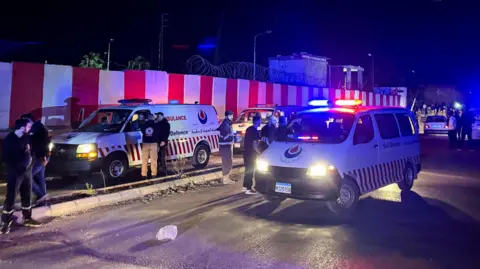 Reuters
ReutersAt least 13 people have been killed in an Israeli strike near a Palestinian refugee camp in southern Lebanon, the country's health ministry says.
The Israeli military said it had targeted members of the Palestinian armed group Hamas "operating in a training compound... in the Ein el-Hilweh area".
It said the location was used by Hamas to plan and carry out attacks against Israel - but provided no evidence to support the claims. Hamas has not commented.
Israel has carried out regular air strikes on people and places in Lebanon since a deal to end the conflict with the Iran-backed armed group Hezbollah. Most strikes have targeted Hezbollah but Israel has also attacked Hamas in the country.
As well as those killed in the strike, Lebanon's health ministry said at least four people had been left wounded.
Images showed emergency workers at the entrance of Ein el-Hilweh, the largest Palestinian refugee camp in Lebanon.
Footage online also showed ambulances rushing through the narrow streets of the crowded camp as a huge plume of smoke billowed from the location hit.
Initial reports say the attack struck an area outside a mosque that is usually busy at night. Palestinian factions are known to be present in the camp.
In its statement, the IDF said "measures were taken to reduce the chance of harm to civilians, including the use of precision munitions, aerial observations, and additional intelligence information".
Hamas attacked southern Israel from Gaza on 7 October 2023, killing about 1,200 people and taking 251 others as hostages. Israel's military response has killed at least 69,169 Palestinians in Gaza, according to the territory's Hamas-run health ministry.
Fighting between Israel and Hezbollah escalated after the Lebanese group fired rockets at Israeli positions the day after 7 October 2023. Hezbollah said it was acting in solidarity with Palestinians in Gaza.
Israel and Hezbollah fought an escalating conflict for 13 months that culminated in an intense Israeli bombing campaign and ground incursion into southern Lebanon in October 2024.
Lebanese authorities said Israel's attacks killed about 4,000 people there - including many civilians - and led to the displacement of more than 1.2 million residents. Israeli authorities said more than 80 of its soldiers and 47 of its civilians were killed in the hostilities.

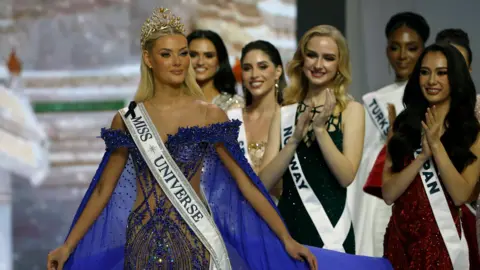 EPA
EPATwo Miss Universe judges have resigned days before the annual beauty pageant, with one of them accusing organisers of rigging the selection process.
Lebanese-French musician Omar Harfouch, who announced his resignation from the eight-member jury on Instagram, alleged that an "impromptu jury" had pre-selected finalists ahead of the competition, set to be held on Friday in Thailand.
Hours later, French football manager Claude Makélélé also announced he'd pulled out, citing "unforeseen personal reasons".
The resignations come just weeks after several Miss Universe contestants walked out of a pre-pageant event over controversial comments made by an official from host nation Thailand.
"An impromptu jury has been formed to select 30 finalists from among the 136 participating countries, without the presence of any of the real [eight] members of the jury, including me," Mr Harfouch wrote in an Instagram post on Tuesday, saying he had discovered this via social media.
The unofficial jury comprises "individuals with a significant potential conflict of interest due to some personal relationships with some of the Miss Universe contestants", he claimed.
Mr Harfouch did not elaborate on how this "impromptu jury" would function, or how it would override the official jury's decision.
The Miss Universe Organisation on Tuesday put out a statement to rebuff Mr Harfouch's claims, saying that "no external group has been authorised to evaluate delegates or select finalists".
It suggested that Mr Harfouch may have been referring to the Beyond the Crown programme: a "social impact initiative" that operates independently from the Miss Universe competition, and has a separate selection committee.
The Miss Universe Organisation announced the Beyond the Crown selection committee on Monday. In its statement on Tuesday, the Organisation said that Mr Harfouch's allegations had "mischaracterised" the programme.
Mr Makélélé, who also announced his resignation via Instagram, described it as a "difficult decision".
"I hold Miss Universe in the highest regard. The platform represents empowerment, diversity, and excellence - values I have always championed throughout my career," he wrote.
The beauty pageant drew backlash earlier this month after its Thailand director Nawat Itsaragrisil publicly berated Miss Mexico, Fatima Bosch, at a pre-pageant event for not posting promotional content on her social media platforms.
In videos that have since gone viral, Ms Bosch and several other contestants could be seen walking out of the event, and some could be heard shouting at Mr Nawat.
Mr Nawat later claimed that some of his words were misunderstood - but his conduct nevertheless prompted a stern rebuke from Miss Universe Organisation, which has since sent a delegation of international executives to take over running the competition.
Nearly every Republican in the US House of Representatives voted on a bill to compel the release of documents tied to convicted sex offender Jeffrey Epstein.
The lone "nay" came from the Republican lawmaker from Louisiana, Clay Higgins, who defied his party saying his vote was a principled "NO".
"What was wrong with the bill three months ago is still wrong today," Higgins wrote on X. "It abandons 250 years of criminal justice procedure in America."
The resounding vote in favour of the Epstein bill, 427-1, marks a rare moment of bipartisanship on Capitol Hill. Hours later, the US senate too approved the legislation, clearing the way for the final act - President Donald Trump's signature.

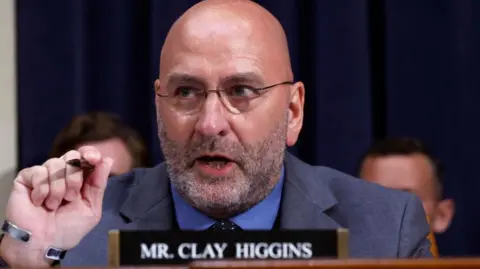 Getty Images
Getty ImagesFor Higgins, safeguarding the personal information of Epstein's many victims was the primary issue with the legislation.
"As written, this bill reveals and injures thousands of innocent people – witnesses, people who provided alibis, family members, etc," he wrote on X. "If enacted in its current form, this type of broad reveal of criminal investigative files, released to a rabid media, will absolutely result in innocent people being hurt."
Higgins said he would support the bill if it were to be amended by the Senate, which Republican majority leader John Thune had already suggested was unlikely.
"When a bill comes out of the House 427 to 1 and the president said he's going to sign it, I'm not sure that amending it is in the cards," Thune said before the Senate's unanimous approval for the bill on Tuesday.
Prior to the House passing the legislation, only four Republicans had joined all Democrats in signing a petition to force a vote - Thomas Massie, Lauren Boebert, Nancy Mace and Marjorie Taylor Greene.
But it achieved overwhelming Republican support after President Trump dropped his opposition to a vote.
Higgins has represented Louisiana's third district since 2017 and is widely regarded as one of the most conservative members of Congress, according to his website.
His holdout vote in the wake of 200-plus members of his party voting otherwise is not the first time he has taken an unorthodox stance.
In 2024, House Republicans voted to censure Higgins for offensive remarks he made on social media after he called Haiti "the nastiest country in the western hemisphere" and referred to Haitians as "eating pets" and "slapstick gangsters".
"All these thugs better get their mind right and their ass out of our country before January 20th," Higgins wrote.
Facebook removed two posts from Higgins in 2020, after he wrote he would "drop any 10 of you where you stand", referring to any armed protesters that might attend a Louisiana demonstration against police brutality.
Facebook told Business Insider at the time the posts "were removed for violating our policies against inciting violence".
Before Congress, Higgins was a member of Louisiana's St Landry's Parish Sheriff's Office. He resigned in 2016 amid backlash about a controversial anti-crime video where he was seen holding a rifle and making threats against gang members.
The BBC has contacted Higgins's office for comment.

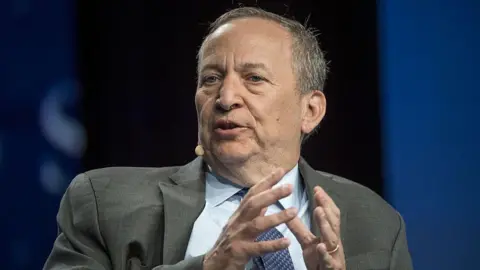 Getty Images
Getty ImagesFormer US treasury secretary Larry Summers is stepping down from the board at OpenAI, a week after a tranche of emails between him and late convicted sex offender Jeffrey Epstein was released.
Summers said in a statement to the BBC that he was "grateful for the opportunity to have served, excited about the potential of the company, and look forward to following their progress".
Summers, who was also once the president of Harvard University, said on Monday that he would be stepping back from public commitments over his ties to Epstein.
The recently released emails showed Summers communicated with Epstein until the day before Epstein's 2019 arrest for the alleged sex trafficking of minors.
In a statement, the artificial intelligence company said it respected Summers' decision to resign.
"We appreciate his many contributions and the perspective he brought to the Board," OpenAI said.
The news comes after both chambers of Congress agreed on Tuesday to pass a measure to require the US justice department to release its files on Epstein.
The measure will then head to the desk of US President Donald Trump for approval. He has said he plans to sign the bill, after reversing his position on the issue following pushback from his supporters.
A batch of Epstein-related emails released by the House Oversight Committee last week mentioned a number of high-profile figures in the financier's former circle, without indicating any legal wrongdoing by those figures.
The emails indicated that Summers and Epstein dined together frequently, with Epstein often trying to connect Summers to prominent global figures.
After the emails were shared with the public, Summers said he took "full responsibility for my misguided decision to continue communicating with Mr Epstein".
He added that he wanted "to rebuild trust and repair relationships with the people closest to me".
Summers held senior posts under two Democratic presidents; serving as treasury secretary under Bill Clinton, and as director of the National Economic Council under Barack Obama.
He led Harvard from 2001 to 2006 and remains a professor there. When announcing his step-down from public commitments earlier on Monday, he said he would continue his teaching commitments.
Following Summers' announcement on Monday, the Center for American Progress, a liberal think tank in Washington where Summers was a senior fellow, confirmed that Summers was no longer affiliated with the organisation.
Summers joined the board of OpenAI, which makes ChatGPT, in 2023 - following a failed attempt to oust its chief executive Sam Altman.

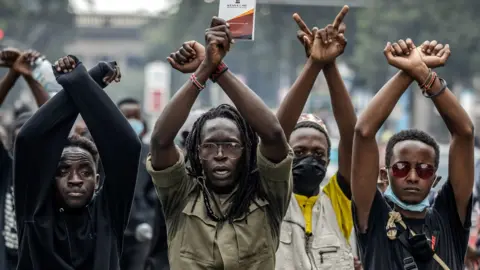 AFP via Getty Images
AFP via Getty ImagesThe Kenyan authorities paid a network of trolls to threaten and intimidate young protesters during recent anti-government demonstrations, Amnesty International has said.
A new report by the human rights organisation said government agencies also employed surveillance and disinformation to target organisers of the mass protests, which swept Kenya across 2024 and 2025.
The demonstrations were driven largely by "Gen Z" activists who used social media platforms to mobilise.
In response to Amnesty's report, Kenya's interior minister said the government "does not sanction harassment or violence against any citizen".
But Amnesty said it had uncovered a campaign to "silence and suppress" the protesters.
Young women and LGBT+ activists were disproportionately targeted, with misogynistic and homophobic comment, as well as AI-generated pornographic images, the report said.
The BBC has approached the government for further comment.
One activist told Amnesty: "I had people coming into my inbox and telling me: 'You will die and leave your kids. We will come and attack you'.
"I even had to change my child's school. Someone sent me my child's name, the age... the school bus number plate. They told me: 'If you continue doing what you're doing then we will take care of this child for you'."
The report features a man who said he was part of a team paid between 25,000 and 50,000 Kenyan shillings (about $190-$390; £145-£300) per day to amplify government messaging and drown out trending protest hashtags on social media platform X.
As well as digital abuse, the authorities have also been accused of carrying out a brutal crackdown on the protests.
More than 100 people died, rights groups say, when police clashed with protesters during two waves of demonstrations - one in 2024 and one in 2025.
The authorities were also accused of arbitrary arrests, enforced disappearances and using lethal force against the protesters.
The government accepted there had been some case of excessive force by police, but also defended the security forces in other instances.
The demonstrations railed against issues such as proposed tax rises, increasing femicide and corruption.
Amnesty chief Agnès Callamard said the organisation's report "clearly demonstrates widespread and coordinated tactics on digital platforms to silence and suppress protests by young activists".
"Our research also proves that these campaigns are driven by state-sponsored trolls, individuals and networks paid to promote pro-government messages and dominate Kenya's daily trends on X," she added.
Kenya's Interior Minister Kipchumba Murkomen said: "The government of Kenya does not sanction harassment, or violence against any citizen... any officer implicated in unlawful conduct bears individual responsibility and is subject to investigation and sanction."
Amnesty also raised concerns about unlawful state surveillance, including allegations - denied by Kenya's largest telecom provider, Safaricom - that authorities used mobile data to monitor protest leaders.

 Getty Images/BBC
Getty Images/BBCGo to BBCAfrica.com for more news from the African continent.
Follow us on Twitter @BBCAfrica, on Facebook at BBC Africa or on Instagram at bbcafrica

 Yonhap News
Yonhap NewsA South Korean passenger ferry carrying 246 passengers and 21 crew has run aground on rocks off the country's south-east coast.
The Queen Jenuvia 2 is stuck on a reef and unable to move, but there is currently no risk of sinking or capsizing, according to the Coast Guard. People are currently being moved to patrol boats, it said.
The accident happened near Jangsan Island in Sinan County on Wednesday evening local time. The vessel ran aground on rocks near the uninhabited island of Jogdo.
Local media reported that five people sustained minor injuries from the impact of the grounding, but there have been no other casualties.
South Korean Prime Minister Kim Min-seok has ordered all available vessels to be mobilised to rescue the ferry.
"We have confirmed that there is currently no flooding. We are transferring passengers to patrol boats and moving them to a safe location," a Coast Guard official said, Chosun Ilbo newspaper reports.
The Coast Guard plans to move the vessel ashore at high tide.
The ferry was travelling to the port city of Mokpo after departing from the resort island of Jeju, carrying 246 passengers and 21 crew members, the Coast Guard.
The area is near the site of the sinking of the Sewol ferry in 2014 that killed more than 300 people, mostly school children heading for a school trip.

 Getty Images
Getty ImagesNicki Minaj - the US-based, multi-million-selling Trinidadian rapper - has publicly backed President Donald Trump's allegations that Christians face persecution in Nigeria.
"In Nigeria, Christians are being targeted," Minaj said on Tuesday at a UN event organised by the US, adding that "Churches have been burned, families have been torn apart … simply because of how they pray."
It follows recent threats by Trump to send troops into Nigeria "guns a-blazing" if its government "continues to allow the killing of Christians".
But the Nigerian presidency says the widespread violence that has long plagued the West African nation affects everyone, regardless of background or belief.
Minaj, whose real name is Onika Tanya Maraj-Petty, said calling for the protection of Christians in Nigeria "is not about taking sides or dividing people,"but about "uniting humanity".
"This is about standing up in the face of injustice. It's about what I've always stood for," she added while standing alongside the US ambassador to the UN, Mike Waltz.
The 42-year-old rapper thanked Trump for "prioritizing this issue and for his leadership".
She described Nigeria as "a beautiful nation with deep faith traditions" and even acknowledged the "beautiful Barbz" - her fans - in the West African country.
Waltz thanked the rapper for "leveraging her massive platform to spotlight the atrocities against Christians in Nigeria".
For months, right-wing campaigners and politicians in Washington have been alleging that Islamist militants were systematically targeting Christians in Nigeria.
Deadly disputes are also often over vital resources like land and water or fuelled by inter-ethnic tensions, rather than religion, say analysts.
Nigeria's government does not deny that there is deadly violence in the country. But says that, "Terrorists attack all who reject their murderous ideology - Muslims, Christians and those of no faith alike".
Minaj previously namechecked her fanbase, known as the "Barbz", as a reason for her intervention, saying online: "The Barbz & I will never stand down in the face of injustice. We've been given our influence by God. There must be a bigger purpose."
Last year she publicly revealed that despite moving from her native Trinidad to New York at an early age, she still does not have US citizenship.
Her appearance at the UN on Tuesday is her highest-profile political intervention to date.
She made headlines during the pandemic for sharing disinformation about side-effects of the Covid vaccine - claiming that when a friend of her cousin had the jab, it caused his testicles to swell up and he became impotent.
"His friend was weeks away from getting married, now the girl called off the wedding," Minaj wrote online.
Her comments were criticised by UK's chief medical officer at the time, and then-Prime Minister Boris Johnson also commented, joking: "I am not as familiar with the works of Nicki Minaj as I probably should be."
In recent months, her years-long feud with fellow New York rapper Cardi B escalated in them trading insults about each others' careers and family members.

 Getty Images/BBC
Getty Images/BBCGo to BBCAfrica.com for more news from the African continent.
Follow us on Twitter @BBCAfrica, on Facebook at BBC Africa or on Instagram at bbcafrica

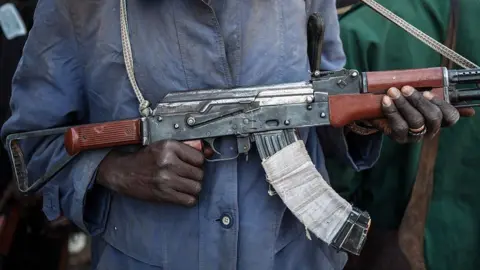 Getty Images
Getty ImagesTwo girls, who were among at least 25 children and a teacher kidnapped from their boarding school in north-western Nigeria's Kebbi state on Monday, have managed to escape, a local official told the BBC.
The pair ran away as their armed captors were leading them into the bushes and got away across farmland, Hussaini Aliyu of Danko Wasagu council said.
He added that the girls were "back and are safe", but one of them needed medical treatment as she had hurt her leg while fleeing.
The assault left two members of staff dead - a teacher was killed while trying to protect girls and a security guard later died in hospital from gunshot wounds.
A team of soldiers, police and volunteers are combing forested areas in an attempt to rescue the captives seized by the gunmen.
"You must continue day and night fighting. We must find these children," Maj Gen Waidi Shaibu, Nigeria's army chief of staff, told troops sent to Kebbi state.
Over the past decade, schools in northern Nigeria have become frequent targets for armed groups, who often carry out abductions to seek ransom payments or leverage deals with the government.
Police say the gunmen, described locally as "bandits", invaded the Government Girls Comprehensive Secondary School in Maga town at about 04:00 (03:00 GMT) on Monday.
Parents face an agonising wait.
One inconsolable father, whose daughter is still being held captive, told BBC Hausa that his family had been crying non-stop and "it's hard to go back home and look at their faces".
He said he had two daughters enrolled at the school one of whom had successfully hid from the attackers, but the other had not been so lucky.
"My two daughters hid in the toilet when the armed men invaded their hostel.
"When the [gunmen] ordered all those hiding to come out, or else they'll kill them, one of my daughters got scared and came out," the father said.
He added that he had heard of the abductions after the Muslim early-morning prayer on Monday, and had rushed to the school and been there ever since.
"My daughter is a very bright and easy-going person," he said.
Police say the attackers "engaged police personnel on duty in a gun duel" before climbing over the perimeter fence and taking the girls from their hostel.
The security guard who died had a granddaughter and great-granddaughter at the same school and they are among those kidnapped.
It has devastated his family.
"I found him in his pool of blood," the security guard's daughter told the BBC. "Then they took my daughter and also my granddaughter."
She said she had been unable to eat or sleep ever since.
The attack highlights the persistent security crisis plaguing the region, leaving families in a state of fear.
Nigeria's central government says it is "deeply concerned" by the abductions.
In a statement on Monday, Information Minister Mohammed Idris Malagi said the authorities "share in the pain" of the affected families and were working urgently to rescue the girls.
He added that President Bola Tinubu remained "unwavering in his commitment to protect every Nigerian, especially schoolchildren".

 Getty Images/BBC
Getty Images/BBCGo to BBCAfrica.com for more news from the African continent.
Follow us on Twitter @BBCAfrica, on Facebook at BBC Africa or on Instagram at bbcafrica

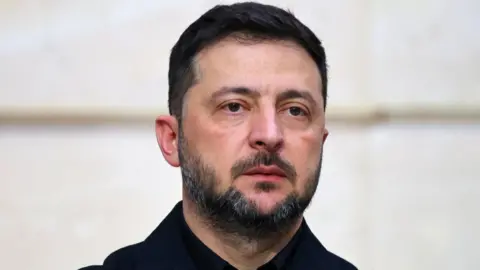 Reuters
ReutersUS special envoy Steve Witkoff is set to join talks with Ukraine's Volodymyr Zelensky and Turkish President Recep Tayyip Erdogan in Ankara on Wednesday, as the Ukrainian president said he wanted to "intensify" peace negotiations.
"Bringing the end of the war closer with all our might is Ukraine's top priority," Zelensky said, adding that efforts would also focus on resuming prisoner exchanges.
Turkey has maintained ties with both Kyiv and Moscow and has previously hosted talks between the two factions.
But no Russian representative is set to join the meeting in Ankara, Kremlin spokesman Dmitry Peskov said.
He added that while there were "no concrete plans" for Vladimir Putin to speak to either the Turkish side or to Witkoff, the Russian president was "of course open to a conversation".
Ankara will be the fourth capital Zelensky visits in only a few days. In Athens he secured a gas deal, in Paris he signed a deal with France to obtain up to 100 fighter jets and in Madrid he held talks on co-operation with Spanish arms manufacturers.
The visits are part of Zelensky's mission to try to shore up European support for Ukraine while Russian attacks on the country intensify and Moscow's troops close in on the key city eastern city of Pokrovsk.
Domestically, Zelensky is facing the most serious crisis in years. Several members of his closest circle are under investigation for co-organising a large-scale criminal scheme, and two ministers have resigned.
The scandal threatens to widen still and some EU leaders – who in December will decide whether to unblock a €140bn (£121bn) loan for Kyiv based on frozen Russian state assets – have warned Zelensky needs to do more to tackle corruption.
As the fourth anniversary of the start of Russia's full-scale invasion in February 2022 inches closer, Moscow and Kyiv remain fundamentally opposed in their views of how to end the war.
Earlier in November Russian Foreign Minister Sergei Lavrov said that Russia's conditions for a peace deal had not changed since Putin laid them out in 2024.
At the time, the Russian president demanded that Kyiv renounce any ambition to join Nato, as well as full Ukrainian withdrawal from the Donetsk, Luhansk, Zaporizhzhia and Kherson regions.
Zelensky has repeatedly argued that withdrawing from Donetsk and Luhansk – together known as the Donbas – would leave the rest of the country vulnerable to future attacks.
Following a long meeting with Putin in April, Witkoff appeared to suggest that a peace deal between Moscow and Kyiv hinged on the status of the contested Ukrainian regions as well as Crimea, which Russia illegally annexed in 2014. This stance led to tensions with Zelensky, who accused him of "disseminating Russian narratives".
Zelensky and Witkoff have not met since early September. Although the summer saw a flurry of high-level talks and meetings - including between Trump and Putin - American efforts to bring a ceasefire between Russia and Ukraine closer have stalled.
At one point, it appeared Trump and Putin were about to meet again in Budapest –but that summit was scrapped, apparently after the US side became aware that Moscow had no intention of budging from several demands that were unacceptable to Kyiv.
But contact between US and Russian officials has continued, albeit under the radar. Putin's special envoy Kirill Dmitriev was reportedly in Washington for meetings with Witkoff in late October, only days after Trump imposed sanctions on Russia's two biggest oil companies.

法新社引述日媒今天报导, 日本新泻县知事花角英世预计将在本周批准重启其县内的柏崎刈羽核能发电厂,也是全球规模最大的核电厂。
据共同社和《日经新闻》援引匿名消息人士报道,位于日本中西部地区的柏崎刈羽核电站本周有望获得当地知事批准重启运营。
媒体报道称,该核电站所在的新潟县知事花角英世将于周五在新闻发布会上发表讲话。
12日,围绕东京电力公司柏崎刈羽核电站重启问题,花角英世与核电站所在地的该县柏崎市市长樱井雅浩、刈羽村村长品田宏夫在市内举行了会谈。
法新社说, 在柏崎刈羽核电站的七座反应堆中,只有一座将恢复运行。
2011年海啸和福岛第一核电站事故后,日本关闭了所有核反应堆。
自那以来,已有14座反应堆(主要位于西部和南部地区)在实施严格的安全标准后恢复了运行。
如果柏崎刈羽核电站的重启获得批准,这将是福岛核电站运营商东京电力公司在灾难后首次重启核电站。
日本政府继续支持核能,认为这是日本实现2050年碳中和目标所需的可靠、清洁的能源。

与乌克兰接壤的北约成员国罗马尼亚周三凌晨出动战斗机应对再次入侵其领空的无人机。
罗马尼亚国防部表示,在俄罗斯空袭乌克兰之后,两架驻扎在罗马尼亚的德国战机于午夜过后不久升空监控罗-乌接壤地区的空中情况。
罗马尼亚国防部补充说:“另有两架罗马尼亚空军的F-16战斗机紧急升空。
罗马尼亚国防部的声明说说,在俄罗斯空袭乌克兰靠罗马尼亚的边境后,“无人机在雷达上断断续续地出现了约12分钟”,并补充说,目前尚未收到地面坠落的报告。
罗马尼亚军方当局已向无人机出没的两个地方的居民发送预警通知。
周一,在俄罗斯无人机袭击乌克兰的一艘运载液化石油气的船只并引发火灾后,罗马尼亚下令疏散两个村庄,这是该国自乌克兰战争以来首次采取此类行动。疏散令已于周二解除。

© Emily Kask for The New York Times

© Kristian Thacker for The New York Times

法新社消息称,根据周三(11月19日)公布的官方数据,今年中国重新成为德国第一大贸易伙伴,超过了因贸易战而受影响的美国。
今年1月至9月,中国与德国的贸易往来,也就是进口与出口总和达到1859亿欧元,同比增长0.6%。德国联邦统计局在一份公告中表示,相比之下,同期德美贸易额则下降3.9%,至1847亿欧元。在2016年至2023年间,中国一直是德国的第一大贸易伙伴,直到去年才被美国取代。
今年春季生效的美国关税使德国对美出口大幅下滑近8%,对德国的出口导向型经济模式冲击不小。与此同时,由于中国竞争日益激烈,对华出口也减少了12.3%。
虽然中国是德国的第一大贸易伙伴,但从贸易收支来看,自今年1月以来,德国对华贸易逆差达到647亿欧元,而对美贸易顺差为411亿欧元,美国仍是德国最大的出口市场。
LBBW经济学家延斯-奥利弗·尼克拉施(Jens-Oliver Niklasch)对法新社说:“中国产业在许多领域都有了显著发展,质量方面也在提升。”在他看来,中国如今更被视为“竞争者”而非“贸易伙伴”。ING经济学家卡斯滕·布热斯基(Carsten Brzeski)对法新社指出,这一变化反映出德国对稀土和半导体等中国占据主导地位的关键材料仍“持续的依赖”。
目前正值德国财政部长克林拜尔周三在上海访问之际,这是德国总理默茨政府自5月执政以来首次对中国进行正式访问,在半导体供应紧张、以及欧盟指责中国汽车产业存在不公平竞争的背景下,默茨的政府对中国这全球第二大经济体仍保持谨慎态度。不过为推进中德合作,这位德国财长呼吁“竞争必须公平,并且稀土和原材料的获取必须得到保障”。

法新社消息称,法国商业和工业领域的12家行业联合会携手“大约一百家品牌”周三(11月19日)宣布,将以“不正当竞争”为由起诉 Shein,还要求承认法国本土商家所遭受的经济损害,并就这些损失支付赔偿金。
法国商业委员会(CDCF)及多家行业组织在一份声明中解释称,Shein 的经营模式建立在“无视适用于所有在法国经营企业的法规基础之上”。
除法国商业委员会外,此次行动还得到了代表大型零售业、服装及纺织行业、珠宝业、玩具行业、特许经营以及电商行业等组织的共同参与。声明还称,此次“史无前例的”法律行动还获得了约百家零售企业的加入。各联合会和企业“表达了恢复基于守法前提下的公平竞争的决心”。
Shein 发言人向法新社回应称,这一指控毫无依据,这些参与者选择诉讼对抗,而不是建设性对话。Shein 还补充说:“此次举动更像是一种试图抵制的行为,而不是严肃的法律行动。”
此次诉讼将提交至法国艾克斯-普罗旺斯(罗讷河口省)的商事法庭。正式庭审可能会在“未来12至18个月内”举行。此外,Shein 在爱尔兰的子公司已在当地一家男装品牌 Olly Gan 的清算程序中被以“不正当竞争”之名起诉。

 BBC
BBCGoogle's ultra-private CEO Sundar Pichai is showing me around Googleplex, its California headquarters. A walkway runs along the length of it, passing by a giant dinosaur skeleton, a beach volleyball pitch and dozens of Googlers lunching under the hazy November sun.
But it's a laboratory, hidden away at the back of the campus behind some trees, that he is most excited to show me.
This is where the invention that Google believes is its secret weapon is being developed.
Known as a Tensor Processing Unit (or TPU), it looks like an unassuming little chip but, says Mr Pichai, it will one day power every AI query that goes through Google. This makes it potentially one of the most important objects in the world economy right now.
"AI is the most profound technology humanity [has ever worked] on," he insists. "It has potential for extraordinary benefits - we will have to work through societal disruptions."
But the confusing question lingering over the AI hype is whether it is a bubble at risk of bursting - as, if so, it may well be a spectacular burst akin to the dotcom crash at the start of the century, with consequences for us all.

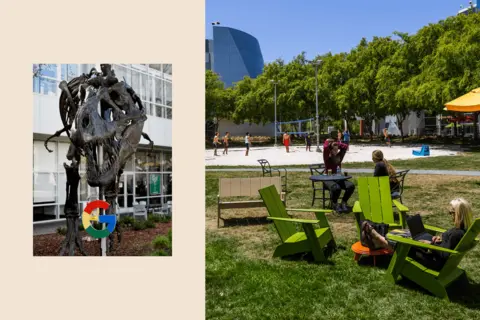 Bloomberg via Getty Images
Bloomberg via Getty ImagesThe Bank of England has already warned of a "sudden correction" in global financial markets, saying "market valuations appear stretched" for tech AI firms. Meanwhile. OpenAI boss Sam Altman has speculated that "there are many parts of AI that I think are kind of bubbly right now".
Asked whether Google would be immune from a potential bubble burst, Mr Pichai said it could weather that potential storm - but for all his starry-eyed excitement around the possibilities of AI, he also issued a warning: "I think no company is going to be immune, including us."
So why, then, is Google investing more than $90bn a year in the AI build-out, a three-fold increase in just four years, at the very moment these suggestions are being discussed?
The AI surge - of which Google is just one part - is, in cash terms, the biggest market boom the world has seen.
Its numbers are extraordinary - there is $15 trillion of market value at Google and four other tech giants whose headquarters are all within a short drive of one another.
Chipmaker turned AI systems pioneer Nvidia in Santa Clara is now worth more than $5 trillion. A 10-minute drive south, in Cupertino, is Apple HQ, hovering around $4 trillion; while 15 minutes west is $1.9 trillion Meta (previously Facebook). And in the centre of San Francisco, OpenAI was recently valued at $500bn.


The purely financial consequences of this trend are significant enough.
The value of the shares in these companies (and a few others outside Silicon Valley, such as Microsoft in Seattle) have helped cushion the US economy from the impact of trade wars, and kept retirement plans and investments buoyant - and not just in the US.
Yet it comes with a big risk. That is, the incredible dependence of US stock market growth on the performance of a handful of tech giants. The Magnificent 7 - Alphabet, Amazon, Apple, Meta, Microsoft, Nvidia, and Tesla - collectively comprise one third of the valuation of America's entire S&P 500.
And that market value is now more highly concentrated in a few firms than it was during the dotcom bubble in 1999, according to the IMF.
Mr Pichai points out that every decade or so come these "inflection points": the personal computer, then the internet in the late 1990s, followed by mobile and cloud. "Now it's clearly the era of Artificial Intelligence."
But as for the big question - is it a bubble?
Mr Pichai argues there are two ways of thinking about it. First, there is "palpably exciting" progress of services that people and companies are using.
But he concedes: "It's also true when we go through these investment cycles, there are moments we overshoot collectively as an industry…
"So I think it's both rational and there are elements of irrationality through a moment like this."

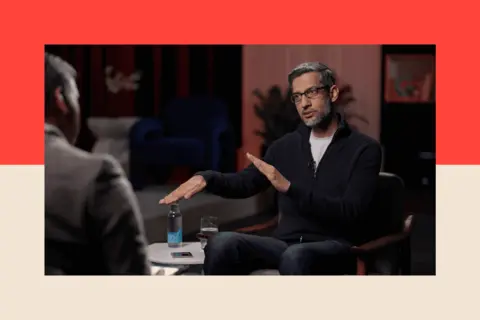
Now, a distinction is emerging in the markets between those businesses that rely on often borrowed money and complicated deals to access the chips that power their AI, and the biggest tech companies, such as Google, Microsoft and Amazon, which can fund investment in chips and data from their own pockets.
Which brings us to Google's own silicon chips, or their prized TPUs.
The lab, where they are tested, is the size of a five-a-side football pitch with a mesh of multi-coloured wires and deep blue blinking lights. Signs all around read: "restricted".
What's striking is the sheer noise - this is down to the cooling systems, which are needed to help control the temperature of the chips, which can get incredibly hot when crunching trillions of calculations.

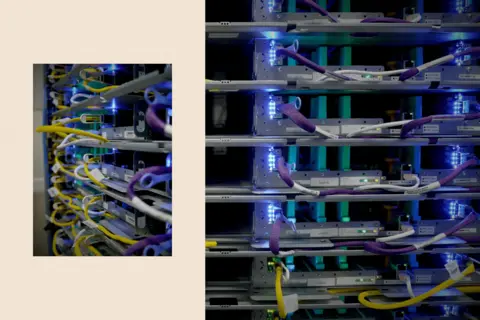
The TPUs are designed to help power AI machines. And they work differently from other types of chips.
The CPU (central processing unit) is the primary component of a computer - essentially its brain - that performs most of the processing and control functions, while GPUs (graphics processing units) perform more specialised processing, executing many parallel tasks at once - this can include AI.
However Asics (application-specific integrated circuits), are chips custom-built for a specific purpose, for example, a specific AI algorithm. And the TPU is a specialist Google-designed type of Asic.

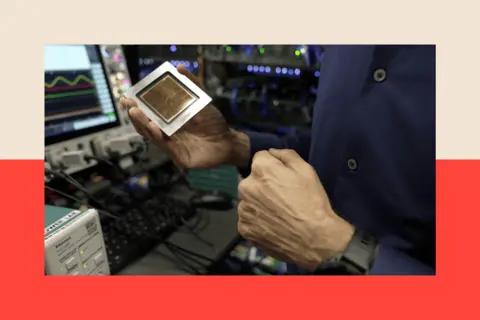
A core aspect of the AI boom has been the mad dash to amass lots of top-performing chips and put them into data centres (or the physical facilities that store, process and run large amounts of data and software).
Nvidia's boss Jensen Huang once coined the term "AI factories" to describe the massive data centres full of pods and racks of super chips, connected to huge energy and cooling systems.
(Tech bosses such as Mark Zuckerberg have referred to some being the size of Manhattan. The Google TPU lab is somewhat more modest, testing out the technology for deployment elsewhere.)
Stories abound of tech bros begging chip makers for hundreds of thousands of these highly engineered pieces of silicon. Take the recent dinner at Nobu in Palo Alto, where Elon Musk and Larry Ellison, the founder and head of Oracle, tried to woo Nvidia's Jensen Huang, to sell them more of them.
As Mr Ellison put it: "I would describe the dinner as me and Elon begging Jensen for GPUs. Please take our money - no, no take more. You're not taking enough. We need you to take more, please!"
It is precisely the race to access the power of as many as possible of these high performance chips, and to scale them up into massive data centres, that is driving an AI boom - and there's a perception that the only way to win is to keep spending.
The terrace of the Rosewood Sand Hill hotel, a sprawling 16-acre estate near the Santa Cruz mountains that serves crab rolls and $35 signature vodka martinis, is where the big Silicon Valley deal-making gets done. It's close to Stanford University and Meta's HQ, as well as the headquarters of major venture capital firms.
There are whispered rumours about who will be next to announce customised AI chips - Asics - to compete with Google and Nvidia.
Just before I visited, something of a storm was brewing about the investment plans of OpenAI, which Elon Musk co-founded.
The firm, which started as a not-for-profit but has since established a commercial structure, has been the focus of a web of cross-investments involving buying up chips and other computer hardware needed for AI processing.
Few in the industry doubt OpenAI's phenomenal user growth - in particular the popularity of its chatbot, ChatGPT. It has ambitions to design its own custom AI chips, but some have speculated about whether it might need government support to achieve this.

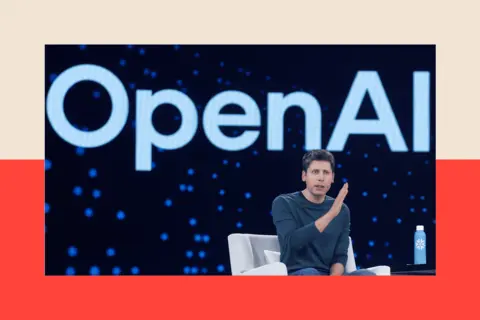 Getty Images
Getty ImagesIn a podcast episode that aired last month, an OpenAI investor questioned how the company's spending commitments tallied with its revenues, to which co-founder Sam Altman shot back, challenging the revenue figures quoted, and adding: "If you want to sell your shares, I'll find you a buyer. Enough."
He has since shared a lengthy post on X, explaining, among other things, that OpenAI is looking at commitments of about $1.4 trillion over the next eight years and why he believes now is the time to invest in scaling up their technology.
"I do not think the government should be writing insurance policies for AI companies," he said.
But he also said: "What we do think might make sense is governments building (and owning) their own AI infrastructure."

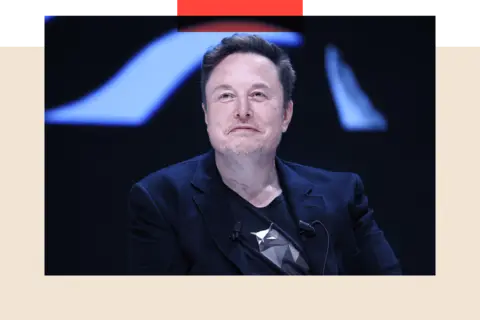 Getty Images
Getty ImagesElsewhere, there have been notable very recent falls in share prices of AI infrastructure companies - Coreweave, a start-up that supplies OpenAI, saw its shares lose 26% of their value earlier this month.
Plus, there have been some reactions in markets for perceived credit risk among other firms. And while most of these tech share prices have generally climbed higher over the course of 2025, there has been a mild dip more generally in the past few days.
None of this has dampened the excitement over AI's potential within the industry. Google's consumer AI model, Gemini 3.0, launched to great fanfare earlier this week — this will pitch Google in a direct battle with OpenAI and its still-dominant ChatGPT for the market share.
What we don't yet know is whether it marks an end to the days of chatbots going rogue and recommending glue as a pizza ingredient. So, is the end result of all this fantastic investment is that information is less reliable, I asked Mr Pichai.
"I think if you only construct systems standalone and you only rely on that, [that] would be true," he told me. "Which is why I think we have to make the information ecosystem has to be much richer than just having AI technology being the sole product in it."
But I put it to him that truth matters. His response: "truth matters".
Nor is the other big question facing tech today dampening the enthusiasm around advancing AI's potential. That is: how on Earth to power it?
By 2030, data centres around the world will use about as much electricity as India did in 2023, according to the IMF. Yet this is also an age where energy supply is under pressure by governments committing to climate change targets.
I put this to Google's Mr Pichai, asking if it is coherent to have ambitions to generate 95% of electricity from low-carbon sources by 2030 - as the UK government does - and also be an AI superpower?
"I think it's possible. But I think for every government, including the UK, it's important to figure out how to scale up infrastructure, including energy infrastructure.
"You don't want to constrain an economy based on energy," he adds. "I think that will have consequences."
Years ago, as a fledgling reporter I cut my teeth in the 2000 dotcom bubble. It followed a famous speech by Federal Reserve Governor Alan Greenspan about "irrational exuberance".
In that time I interviewed Steve Jobs twice, and a few years later questioned Mr Pichai's predecessor Larry Page, and commentated live on the collapse of WorldOfFruit.com.
Through it all, one lesson became clear: that even in the worst-case scenarios and the toughest of crashes, catastrophe isn't guaranteed for all.
Take Amazon - its share price slumped to $6 and its market capitalisation fell to $4bn during that crash, yet some 25 years on Jeff Bezos and his company are very much going strong. Today Amazon is worth $2.4 trillion.
The same would, inevitably, be true of companies shaken by a potential AI bubble burst.

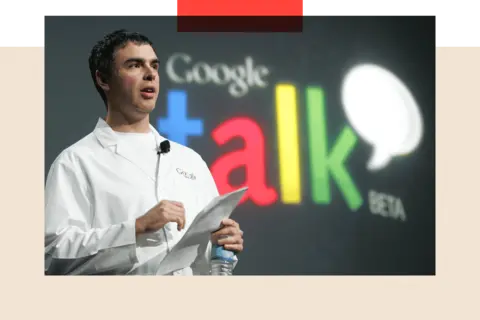 WireImage
WireImagePlus there is another looming factor that may well explain why so many in Silicon Valley - and beyond - are blind to, or perhaps choosing not to, acknowledge this risk, and pushing on regardless.
That is, the attraction of the glittering prize at the end: achieving artificial general intelligence (AGI).
This is the point at which machines match human intelligence, something many believe is within reach. Or beyond that, reaching artificial super-intelligence (ASI), the point at which machines surpass our intelligence.
But I was also told something else that was thought-provoking by a Silicon Valley figure - that it doesn't matter whether there really is a bubble or if it bursts. Step back and what is going on in the bigger picture is a global battle for AI supremacy, with the US against China taking centre stage.
And while Beijing funds these developments centrally, in the US it is a messy but productive free market free for all, which means trial and error on an epic scale.
For now, the US has superiority in silicon over China - companies like Nvidia with their GPUs and Google with their TPUs can afford to accelerate into the storm.
Others will surely fail, and spectacularly so, affecting markets, consumer sentiment and the world economy. The physical footprint left behind, however, containing sheer computing firepower for the deployment of mass AI technologies, will inevitably shape our economy and could well also shape how we work and learn - and who dominates the world for the rest of the 21st Century.


BBC InDepth is the home on the website and app for the best analysis, with fresh perspectives that challenge assumptions and deep reporting on the biggest issues of the day. You can now sign up for notifications that will alert you whenever an InDepth story is published - click here to find out how.

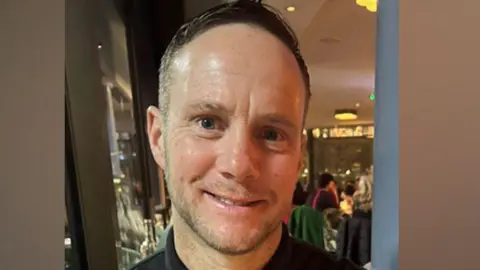 Facebook
FacebookThe death of an Oasis fan who fell from height at a concert at Wembley Stadium was a "tragic accident", a pre-inquest review has heard.
Lee Claydon, 45, from Bournemouth and known to his family by his middle name Clive, fell from an upper level at the end of the show on 2 August.
At Barnet Coroner's Court, Det Sgt James Raffin, of the Metropolitan Police, told the hearing it was no longer being treated as a criminal case.
"We do not suspect any third party involvement," he said. "This, from everything we have seen, was a tragic accident."
Mr Claydon had been drinking but a toxicology report revealed "no concerns", the officer told the court.
He said the force had also ruled out the possibility of suicide.


Det Sgt Raffin added: "From a police point of view, I would say our investigation is complete."
The officer said he was aware the family had concerns over the "circumstances on the night" and that he would pass these on to officials at Brent Council.
The father of three was pronounced dead at a Wembley medical centre at 22:38 BST, an initial hearing in September was told.
The preliminary cause of death was given as "multiple bodily injuries".
The fall happened during a run of stadium shows for the rock band's sell-out Live '25 reunion tour - their first since splitting in 2009.
Oasis previously said in a statement: "We are shocked and saddened to hear of the tragic death of a fan at the show."
Mr Claydon's father, Clive, paid a tribute to his son, describing him as a "lovely bloke" and a "hard-working family man".
Senior Coroner Andrew Walker said the full inquest would take place on 26 February.

 Getty Images
Getty ImagesWeather warnings for snow and ice have been issued across much of the UK.
Here are some tips for coping with low temperatures.
Babies and young children under five are more at risk in cold weather.
While outside, the NHS advises that babies and children should wear several layers of clothes to keep warm, including a hat and mittens to stop heat loss.
In the car, for safety reasons, you should keep thick jumpers and coats to a minimum, so there is not too much padding between your child and the car seat straps.
If necessary, you can lay a blanket on top of your child once they are safely strapped in.
Remove any hats, gloves and extra layers when you come back inside.
NHS guidance says babies do not need hot rooms at night - a room temperature of between 16-20C (61-68F) is ideal. Overheating is one of the potential causes of sudden infant death syndrome (SIDS).
A sleepsuit and either a sleeping bag or a sheet and/or blanket should be fine.
If you're using a sleeping bag and feel like your baby is cold, you should add an extra layer of clothing - but not extra blankets.
If you are using sheets and/or blankets rather than a sleeping bag, you should use lightweight cellular blankets. Avoid thick, fleecy or padded blankets.

 Getty Images
Getty ImagesCases of flu and norovirus - the winter vomiting bug - typically rise at this time of year, and Covid is still around too.
When it is cold outside, people tend to spend more time indoors, where it can be easier to catch an infection.
For example, coughs and sneezes in an enclosed space with little or no ventilation (windows closed, doors shut) can quickly spread illnesses from person to person.
Opening windows where possible and practising good hygiene - using and then binning a tissue for coughs and sneezes and washing your hands - can help prevent this.
Those who are eligible for the Covid winter booster jab can get it until 31 January 2026. Some groups can also get a free flu vaccine.
Anyone who does not qualify for an NHS vaccine can pay to have either or both jabs privately from a local pharmacy.
Like humans, animals can be at risk of hypothermia if they become too cold.
Veterinary charity PDSA advises giving dogs and cats extra blankets for their beds over the winter months. Raised beds can keep older dogs away from draughts, while cats may like high-up dens.
The charity also recommends extra playtime for pets to make sure they keep active if they are spending less time outside. Indoor toys can help.
Consider keeping cats inside overnight and provide an indoor litter tray.
A sudden drop in temperature can also have a big impact on outside pets, such as rabbits and guinea pigs. They should be given extra bedding for warmth and, if possible, moved to a more sheltered space or even brought inside.
But you should make sure they have enough indoor space to exercise safely.

 Getty Images
Getty ImagesDogs still need walks during cold weather. Usually, their fur will keep them warm.
But the RSPCA advises buying a winter coat or jumper for sick or elderly dogs, or those with thinner fur.
Walk your dog during the day if you can, or consider using LED collars or hi-vis leads if you have to go out in the dark.
Be cautious when letting dogs off the lead in the snow, and supervise them closely as hazards may be hidden. Frozen water may not bear their weight.
If you can, take shorter, more frequent walks rather than one long daily hike.
If your dog gets wet, make sure you dry them off with a towel as soon as you get home and check their paws for salt, grit, dirt or snow.
Drying clothes on radiators is a common practice in the winter.
But it can mean turning on heating in parts of the home you are not using. It may also risk making your home damp, which can cause mould.
One option is to use a dehumidifier, which takes water out of the air. Some have laundry settings and can be run for several hours next to wet clothes on a drying rack.

 Getty Images
Getty ImagesThe financial journalist Martin Lewis has previously pointed out on his BBC podcast that running a dehumidifier is generally "far, far cheaper" than putting on the heating in a room.

 Getty Images
Getty ImagesMany drivers waking up to freezing temperatures have to de-ice their cars.
But motorists are warned not to use boiling water from a kettle - hot water can crack the glass and the water will only freeze again on the screen or on the ground.
Instead, the AA recommends turning on the engine - ensuring the wipers are off to avoid damage - and directing warm air to the windscreen.
You should also turn on your rear windscreen heater, and use air-con if you have it to ensure your windows don't fog up.
The next step is to clear any snow with a soft brush, before using a scraper and liquid de-icer.
Portable heaters can be an alternative to switching on your central heating, but they can pose a serious fire hazard if not used carefully.
Firefighters and safety managers from the Electrical Safety First charity say you should place your heater on a flat surface to ensure it will not fall over.
It should be at least 3ft (1m) away from anything flammable. You should not let curtains, clothes, blankets, duvets or armchairs lean against it.

 Getty Images
Getty ImagesYou should not use your heater to dry your washing, or leave it unattended for long periods of time, or overnight.
Experts also warn against plugging heaters into extension leads, as this could cause a fire.
Leaving electric blankets or heated throws on for too long can also be dangerous, so use the timer function.
You should not use any kind of electric blanket at all if any of the heating wires are visible, there is damage to the power cord or control unit, or it gives off a smell when switched on.
Using gas heaters also carries the risk of carbon monoxide poisoning, so you should ensure you have a working carbon monoxide alarm in the same room.

© Kenny Holston/The New York Times

© Kenny Holston/The New York Times